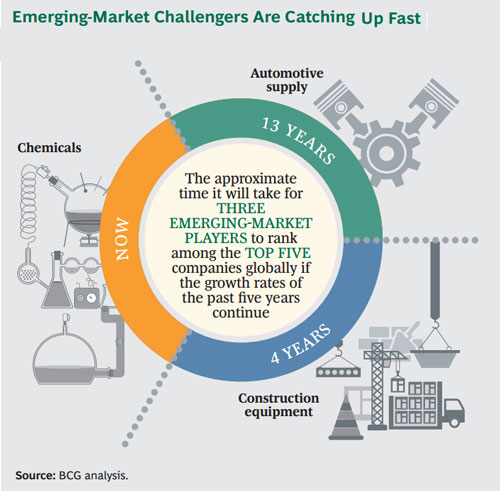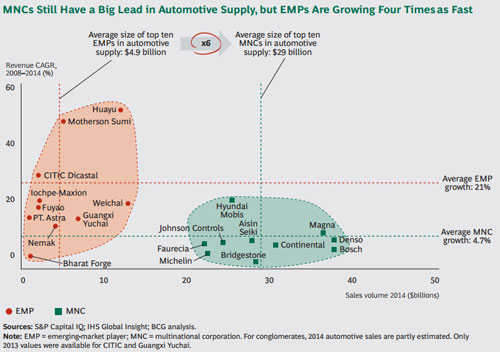Many companies based in emerging markets are closing the gap with multinational companies in three big industries: Automotive Supply, Construction Equipment and Chemicals. Not only that, they are also dramatically transforming all three industries. According to a recent report of The Boston Consulting Group named Dueling with Dragons 2.0: The Next Phase of Global Corporate Competition, these players are fueled by Rapid Growth in Their Home Markets, Acquisitions and Low Costs.

The report notes that the top ten emerging-market companies in most industries have been growing at least five to even ten times faster than the ten leading multinational companies. The rapid growth in their home markets, acquisitions and cost advantages are main reasons for their growth. The report also shows that there are already three emerging-market companies among the world’s five biggest global chemical companies. Besides, if they can maintain the current growth rates, the top five companies in the construction-equipment industry will include three emerging-market companies in 4 years, while the automotive supply industry will take longer time and reach that point in 13 years.

For the automotive supply, which is in an early stage of global competition, the leading multinational companies incumbents still dominate, with 95% of global market share. However, the emerging-market companies have experienced staggering growth of about 21 percent per year over the past six years and are by now all sizable companies. While just a few emerging-market companies - such as Nemak, Motherson Sumi Systems, and Bharat Forge—are already globalized, many others, including Chinese players Weichai Group and Huayu Automotive Systems, are just starting to reach beyond their home markets.
Nikolaus Lang, a senior partner, lead author of the report, and the head of Boston Consulting Group’s Global Advantage practice in Central Europe, Africa and the Middle East, said: “Even though the automotive-supply, construction equipment, and chemical industries are radically different in terms of their natures and competitive landscapes, the leadership positions of multinationals in each industry are under urgent threat from emerging-market players”. He also added: “Many multinational companies will have to undergo a full transformation of their organizations to remain competitive with these new challengers.”

(Source: Bcg.com)